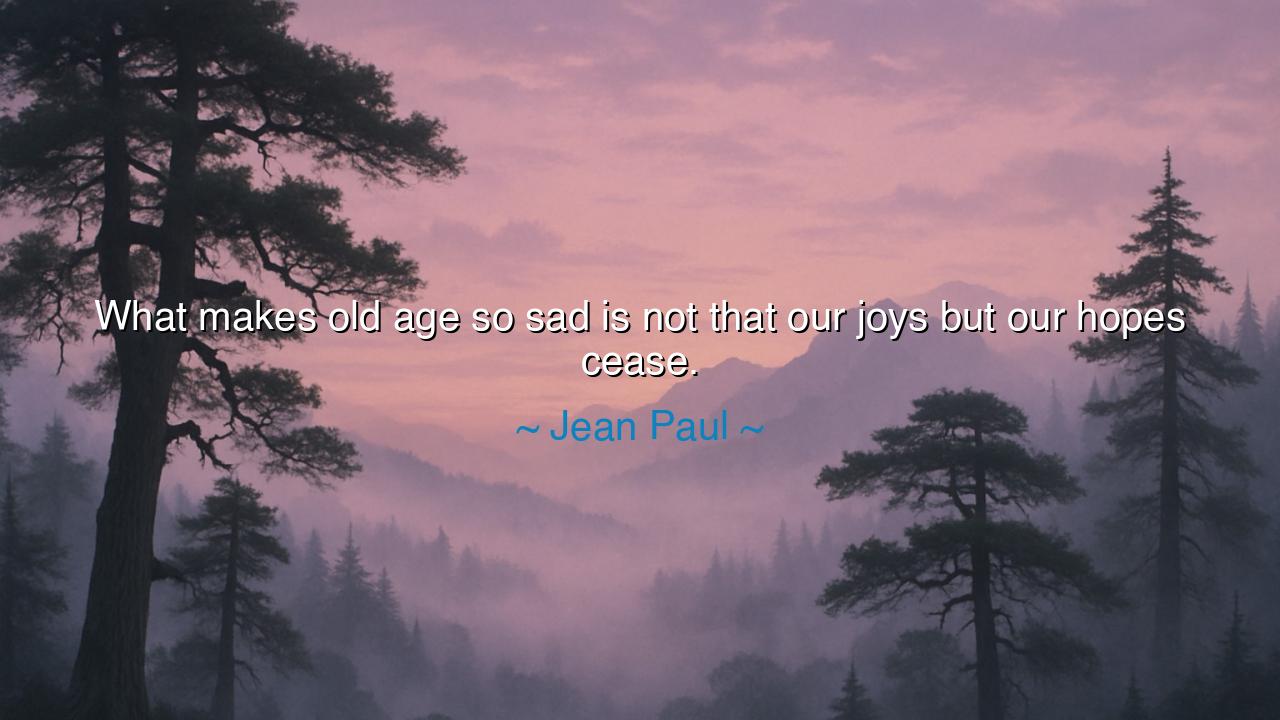
What makes old age so sad is not that our joys but our hopes






"What makes old age so sad is not that our joys but our hopes cease." - Jean Paul. These words resonate deeply with the essence of human experience—the bittersweet reality of growing old. The sadness of old age, Jean Paul suggests, does not lie in the loss of pleasure or delight but in the fading of hope, that ever-present force that drives us forward, that whispers of the future and fuels our ambitions. In youth, our hearts are filled with dreams of what may be, of the endless possibilities that life holds. But as we age, the future becomes a faraway shore, and the hopes that once guided us may seem to fade into the horizon, leaving us with only the present, which, despite its worth, can feel empty without the fuel of anticipation.
Consider the life of Marcus Aurelius, the Stoic emperor who ruled Rome with both wisdom and virtue. Though he is revered as one of the greatest philosophers and emperors of his time, Aurelius did not escape the trials of aging. As he faced the realities of his waning health and the weight of his years, he wrote in his Meditations of the importance of acceptance and the recognition that life, in its finality, is both fleeting and precious. But there, in the midst of his reflections, there is a sense of quiet resignation—an acknowledgment that as his body aged, so too did his hopes become more distant. The vibrancy of youthful dreams gave way to a philosophical acceptance of life’s impermanence, yet one cannot help but feel that the loss of hope—that driving force behind ambition—was a silent sorrow that weighed heavily on his spirit.
It is this loss of hope, more than the physical decline, that makes old age such a profound challenge. When we are young, we look forward to the future with boundless expectation, certain that time holds more promises than regrets. In youth, our hearts are like unopened buds, filled with the potential to blossom into greatness. Yet, as we age, our vision of the future becomes clouded. The dreams we once had seem to slip through our fingers, no longer attainable, and in their place, we may be left with a quiet, unspoken sorrow that the hope of youth has slipped away. This loss, more than any physical ailment or fading joy, is the real sting of old age.
Take, for example, the life of Vincent van Gogh, whose immense talent bloomed in a brief, tumultuous span of time. His later years were marked by personal suffering, a sense of isolation, and a growing hopelessness that his work would ever be appreciated in his lifetime. His paintings, though rich in color and vision, were often driven by a desire to leave a lasting legacy. Yet, van Gogh’s life is an example of the pain of unfulfilled hope, as he could not fully see the impact his work would have. He died young, having lost the hope that his dreams would be realized, and yet, it was his unwavering vision in the face of adversity that made him one of the most significant figures in art history. The sadness in van Gogh’s life was not just the lack of recognition during his years, but the fading of hope that his art would ever speak to future generations—a hope that had long since begun to diminish as he faced the battles of his mind and spirit.
Thus, Jean Paul’s words highlight a critical truth about the human condition: as time passes, it is not the joys of life that diminish, but the dreams and aspirations that fuel them. When we are young, we see the world as an open book, full of unwritten chapters. But as the years pass and those chapters are written, we are often left with regret for the unfulfilled pages, the dreams we never achieved, and the futures that never materialized. The loss of hope in our later years is not merely the absence of ambition, but a quiet sorrow for the lives we imagined but could not live. In this loss, the soul feels the deep weight of time’s passage.
But there is a powerful lesson here, too. The true measure of a person’s life is not in how long they live or how much they accomplish, but in the strength with which they live, even when their hopes have faded. Hope is a vital force, yes, but acceptance and purpose must guide us as we age. The lesson is that true fulfillment does not rely solely on the future, but on embracing the present, on finding meaning in what we have done, and on continuing to live with integrity and passion, regardless of the limitations time may impose. Marcus Aurelius again serves as a model here: though his body weakened, his spirit remained steadfast, and he continued to write, to reflect, and to contribute to the world.
The practical actions we should take are simple but profound. Cultivate a life of purpose at every age, knowing that while hope may fade, your ability to find meaning in the present is what sustains you. Let your dreams evolve, but never let the loss of youthful ambition turn into resignation. Live fully in the present moment, find peace with the past, and cultivate new hopes—even if they are smaller and more grounded in reality than those of your youth. Like the ancient philosophers, we must learn that even without the grand dreams of our youth, there is always purpose, beauty, and wisdom to be found in every stage of life.






AAdministratorAdministrator
Welcome, honored guests. Please leave a comment, we will respond soon